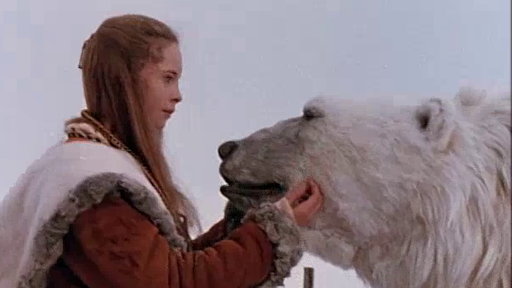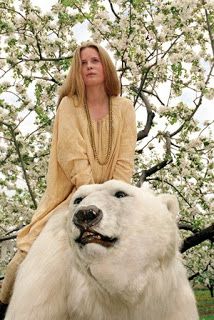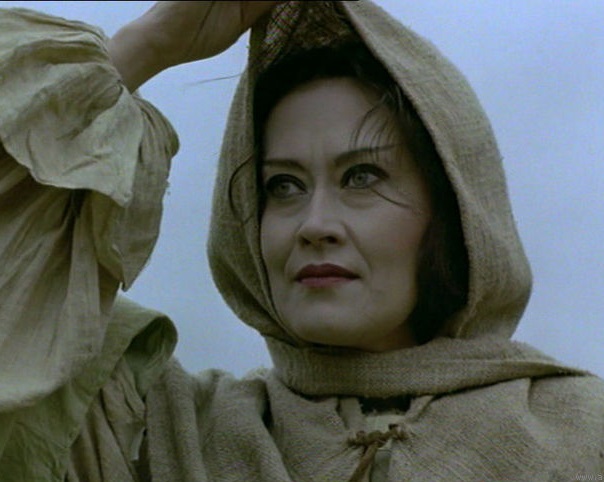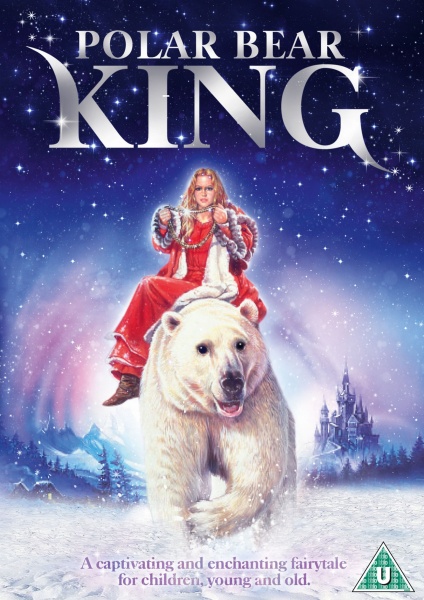Big Worlds On Small Screens & Fantasy/Sci-Fi Films You’ve Probably Never Heard Of: Rebecca Fisher Discusses “The Polar Bear King”
~ by Rebecca Fisher
Everyone has a movie that they know is objectively bad (or at least not very good), but they love it anyway thanks to the nostalgic quality it provides. Such is The Polar Bear King for me.
Filmed in Scandinavia in 1993, it’s a take on the Norwegian folktale East of the Sun and West of the Moon, though those who know their myths and legends will also recognise elements of the French Beauty and the Beast and the Greek myth of Cupid and Psyche: a mysterious husband, a broken promise, a scorned rival, and a brave heroine at its centre.
The King of the Winterland has three beautiful daughters, but though the two eldest are arrogant and flighty respectively, the youngest is haunted by dreams of a handsome prince in an orchard filled with flowers.
In the neighbouring kingdom of the Summerland, Prince Valemon (the only character in this entire movie who gets a name) inherits his father’s throne, only for an evil witch to turn him into a huge white bear as punishment for spurning her advances.
 The Princess meets her future husband
The Princess meets her future husband
His only hope of breaking the spell is to find a bride who will agree to remain married to him for seven years without ever seeing his face. (He turns back into a human for one hour each night). His journey takes him to the Winterland and the youngest princess, but after winning her heart and bringing her back to his castle, it’s only a matter of time before she succumbs to temptation and tries to catch a glimpse of him while he sleeps. With their marital pact broken, he’s now forced to marry the witch…
Fairy tales don’t always make for good movie adaptations due to the way they’re structured, and The Polar Bear King is roughly divided into three distinct parts: the first involving Valemon finding the princess, the second detailing their married life, and the third depicting the princess’s quest to rescue her lost husband from the clutches of the witch. In other words, the story doesn’t end with marriage and children – instead these events mark the halfway point of the film.

But despite the odd pacing, unnecessary narrator and rather stilted acting, there’s something very simple and charming about The Polar Bear King. The bear itself is made courtesy of the Jim Henson Company, and the film is filled with plenty of pre-CGI special effects – such as a pair of magical scissors’ ability to create clothing depicted by reversing the footage of a shirt being cut into pieces, or portraying the princess scaling a vertical cliff in magical shoes by simply tilting the camera onto its side.
There’s even a subtle feminist slant considering the three most powerful players in this story are the witch, the Queen Mother, and the princess herself. Poor Prince Valemon may get a name, but he’s relegated to the role of Dude in Distress for most of the film’s run-time, caught in the middle of a custody battle between a witchy suitor, a sorceress mother, and his heroic wife.
 The witch is not pleased to see Valemon return with a bride…
The witch is not pleased to see Valemon return with a bride…
Just to cap things off, there’s even a cameo appearance from the devil himself, even if he is characterized more as a trickster than the Prince of Darkness.
By today’s standards The Polar Bear King is a strange, slow, dreamy kind of movie. But because I watched it when I was young it has a hold on me, and because it’s a relatively obscure fairy tale movie that you’ve probably never heard of, it has a place in this column.
.
Next Time: Primer
What would happen if you were to build a time machine in your garage? What would you do with it? How would it work? I’ll admit, as of this review I have not yet watched Primer, which in many ways makes it the perfect film to bring this “Fantasy and Sci-Fi Films You’ve Probably Never Heard Of” column to a close, as it was only in the organizing of this project that I discovered its existence.
.
About The Reviewer:
 Rebecca Fisher is a graduate of the University of Canterbury with a Masters degree in English Literature, mainly, she claims, because she was able to get away with writing her thesis on C.S. Lewis and Philip Pullman. She is a reviewer for FantasyLiterature.com, a large website that specializes in fantasy and science-fiction novels, as well as posting reviews to Amazon.com and her They’re All Fictional blog.
Rebecca Fisher is a graduate of the University of Canterbury with a Masters degree in English Literature, mainly, she claims, because she was able to get away with writing her thesis on C.S. Lewis and Philip Pullman. She is a reviewer for FantasyLiterature.com, a large website that specializes in fantasy and science-fiction novels, as well as posting reviews to Amazon.com and her They’re All Fictional blog.
To read Rebecca’s detailed introduction of both herself and the series, as well as preceding reviews, click on:
Big Worlds On Small Screens
Rebecca has recently won the Sir Julius Vogel Award 2015 for Best Fan Writer, for writing including Big Worlds On Small Screens.








